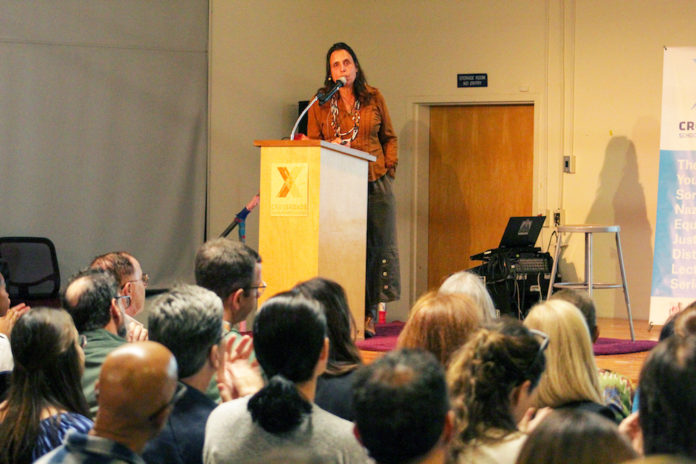
Crossroads School for Arts and Sciences hosted environmental activist, author and politician Winona LaDuke Oct. 14. LaDuke, an economist and graduate of Harvard University, came to Crossroads, a K-12 private school in Santa Monica, as a part of the Equity and Justice Speaker Series, a free program that invites activists and scholars to discuss various aspects of equality. During her speech, LaDuke talked about issues that face the Occidental community and the world at large, from climate change to using sustainable energy. The event drew a large crowd on the evening of Indigenous People’s Day.
When LaDuke took to the stage, the entire room — around 50 people — erupted into a standing ovation. The cheers echoed through the room, lit with fairy lights and a brightly illuminated stage, where LaDuke greeted her fans. She began her speech by introducing herself and where she lives: on the White Earth reservation in northern Minnesota that is home to the Ojibwe tribe. LaDuke talked about the challenges facing the U.S. and the world today, saying humanity is facing catastrophes of Biblical proportions.
LaDuke said one of the main contributors to climate change is the use of fossil fuels. Not only are they in everything people use, but society is willing to compromise their responsibility to the environment and do extreme damage to the environment to access them, something that addicts do in their personal lives. Offering her personal experience with the fossil fuel industry, LaDuke discussed a pipeline that threatens to run through the reservation where she lives.
Not only are these pipelines threatening to the Indigenous people who live on the reservation, but they are not efficient, LaDuke said. Enbridge, the company which is planning on expanding through the White Earth reservation, has had multiple safety violations, including 47 environmental violations. LaDuke said that the US over-consumes resources, which is not efficient or sustainable. LaDuke offers putting money into sustainable energy as a solution to fossil fuel emissions.
The investment into sustainable energy sources that LaDuke described can be seen at Occidental. At the northeast end of Occidental’s campus, there is a 4,971 solar panel farm, generating 12.6 percent of the college’s electricity per year. Physics professor and department chair Daniel Snowden-Ifft pitched the idea in 2009, and it has already saved the college more than $1.3 million in its six years of operation.
“I wanted to do something on campus, and I wanted to do something big,” said Snowden-Ifft. “Climate change is a big problem; there’s no sense in thinking small here.”
In order to get the solar array approved, Snowden-Ifft had to prove that investing in the solar array would be more financially lucrative than investing in other companies. According to Snowden-Ifft, investing in renewable energy is becoming increasingly accessible due to falling prices.
“Solar panel prices have been dropping so fast. It’s just mind-boggling. It’s almost like every three months you’ve got to redo the calculation to keep up with the field,” Snowden-Ifft said.
Martha Matsuoka, professor of the Urban and Environmental Policy Department (UEP), said one of the most important messages LaDuke talked about are her long-term views on the environment and sustainability.
“If you think about this big arc that is connected together, what we do today is a reflection of what came before us, but also has everything to do with where the trajectory goes in the seven generations forward,” Matsuoka said.
According to Matsuoka, the apocalyptic vision many young people fear in the current political and environmental climate can be paralyzing. However, she emphasized the importance of taking action and realizing that all people are a part of that arc and everyone has a responsibility to do something.
“If there’s anything I think about the climate frame, I think it is about our planetary vision and it’s about our humanity,” Matsuoka said.
LaDuke closed her speech by taking questions from the audience, addressing the challenges humanity faces as a nation and the world. A student asked what advice she had about the challenges facing the globe, particularly the younger generation, who will most vastly feel the impact of climate change.
“Do not operate out of a place of fear. Operate out of a place of hope. Operate with love and hope,” LaDuke said. “Life really wants to happen. Life wants to be. Love wants to be.”
![]()



































